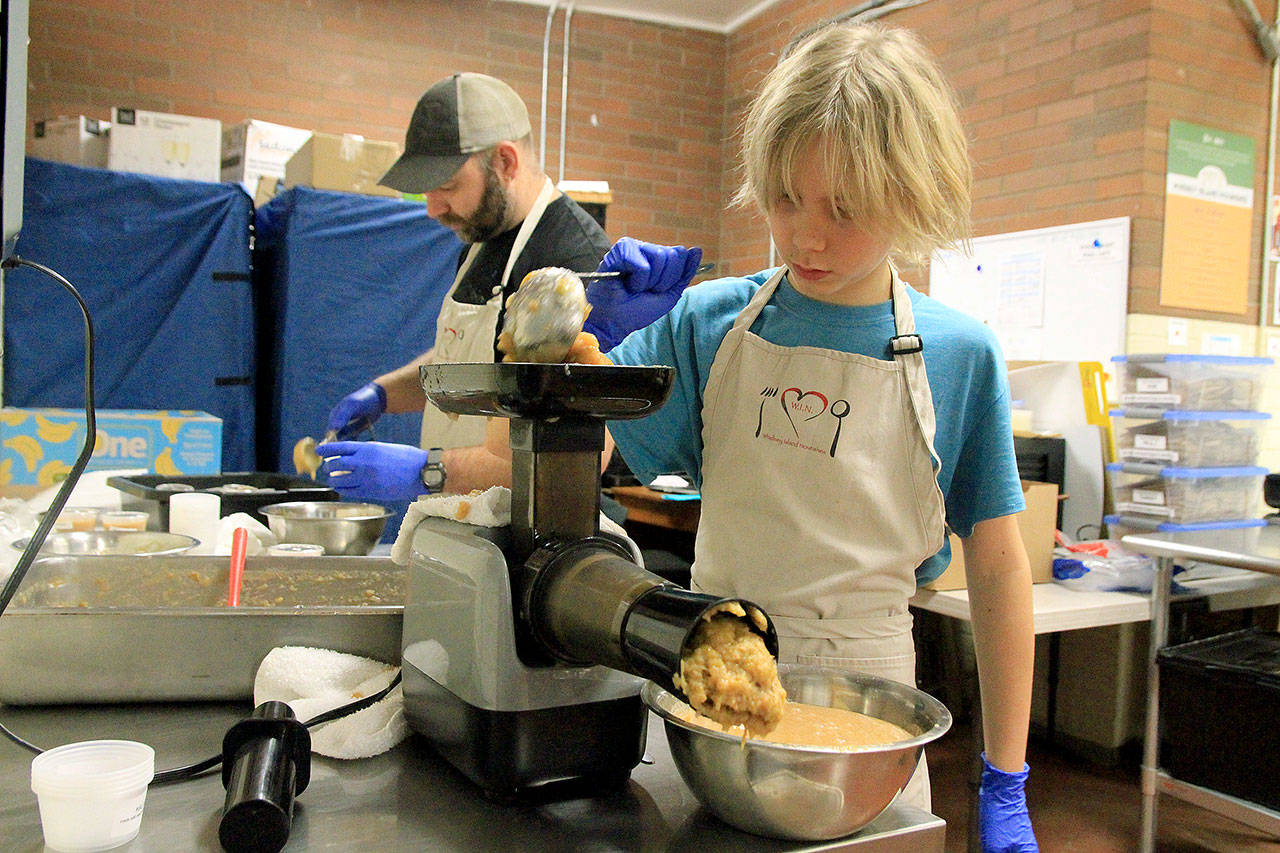For the past 12 years, a dedicated group of volunteers has helped ensure kids on South Whidbey don’t go hungry.
The five friends who started making lunches for homeless youth estimated they served about 200 meals per month. Now the organization known as Whidbey Island Nourishes boasts 90 volunteers and serves around 3,500 meals each month to kids, their families and other individuals struggling to make ends meet.
The food program provides weekend meal bags for kids in the South Whidbey School District, self-serve sack lunches at the Good Cheer Thrift Stores and now a snack program for South Whidbey Elementary School classes.
“I’m kind of amazed when I’m out and about that there are still people who have never heard of WIN,” said Barb Schlitz, a longtime volunteer and a member of the board of directors.
WIN’s newest addition, the elementary school snack program, was created last month to help relieve the pressure of teachers having to provide snacks for their students. Kids are served fresh produce, some of it from the school’s garden where they helped grow it.
“It’s been a pet project of mine for a while, just recognizing that most kids don’t get the recommended serving of fruits and vegetables daily,” said Melinda Gardiner, operations manager.
What sets WIN apart from other food programs is the quality of its food. Meals and snacks are not processed and pre-packaged but grown in the school community gardens, baked in the homes of volunteers and assembled in the kitchen of the elementary school.
WIN works with local farms to help obtain some of the food, and the rest is purchased in bulk from grocery stores.
Volunteers have made apple sauce, trail mix, kale salad, hummus and burritos, with an emphasis on nutrition.
In 2019, WIN switched from plastic to paper bags for sandwiches, with the goal of keeping 45 pounds of plastic out of landfills. Last year the organization served 17,285 sandwiches, 42,480 cheese sticks, 702 pounds of peanut butter and 5,700 hard boiled eggs, among many other food items.
There is no minimum income requirement families must meet to receive food from WIN.
The food program delivers to local nonprofits Ryan’s House, the HUB, the Whidbey Homeless Coalition and House of Hope. Families signed up with the backpack program can also have meals delivered to their homes.
Partnerships with the South Whidbey Children’s Center and the Family Resource Center have allowed for more bags to be distributed to kids and their families.
Family Support Specialist Cailyn Murray said the Family Resource Center, where most people sign up at the annual back-to-school fair, had 140 students from 69 families registered to receive weekend bags this school year.
“I so much appreciate the dedication of the WIN volunteers and Melinda,” Murray said in an email. “WIN is a jewel of an organization.”
Board President Pam LeLoup likes to compare the volunteering process to “a magical dance,” as volunteers prepare and package food, and others, the “unsung heroes,” start dishes. In the beginning, it took nearly three hours each day for volunteers to finish. Now, it takes a little less than half of that time as the process has become more streamlined over the years.
Caeleb Wiph, one of the organization’s youngest volunteers, comes every week.
“I like how it’s helping others,” the 10-year-old said about the food program.
Other kids who come to help out in the kitchen have been in 4-H clubs, part of Girl Scout troops or with the Waldorf School.
While the volunteers do not personally know many of the recipients of the food program, a multitude of thank-you notes pepper the bulletin board of the elementary school kitchen, where food is primarily prepared.
“And the neat thing is, these kids don’t know who we are,” volunteer Jelcy Romberg said. “We could be in the same grocery store, and we wouldn’t know who they were.”
Gardiner said she knew a friend who was helping to foster a child. Her friend went on the WIN program to help provide for the child, who looked forward to receiving meals as if they were birthday gifts.
“It created a sense of stability for him, getting that WIN meal every week,” Gardiner said.
LeLoup said she has known people who utilize the program after a recent divorce or after being laid off from a job. Some use the program for a long time, others for a little.
Gardiner estimates it takes around $14,000 every month to keep WIN running.
“We fundraise like crazy, like all nonprofits,” LeLoup said. “We try to really collaborate with lots of other groups.”
The greatest need right now besides donations is for more bakers, who can dedicate an hour or two of their time each week in their personal kitchens, even if they don’t have time to commit during the week in the elementary school kitchen.
Seats are still available at the upcoming annual fundraiser on Feb. 8, La Dolce Vita, hosted by Useless Bay Coffee Company. Tickets can be purchased online at WIN’s website.



